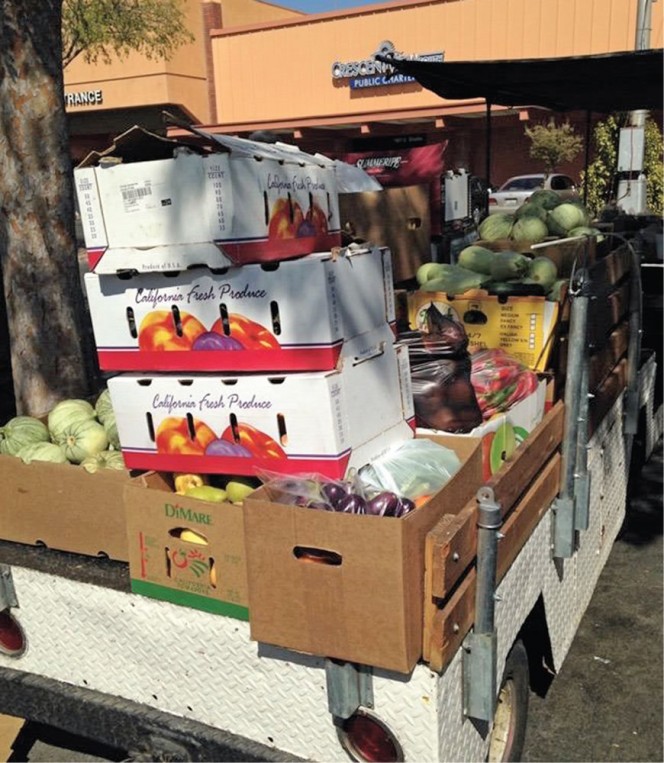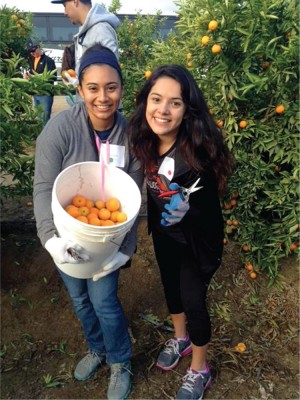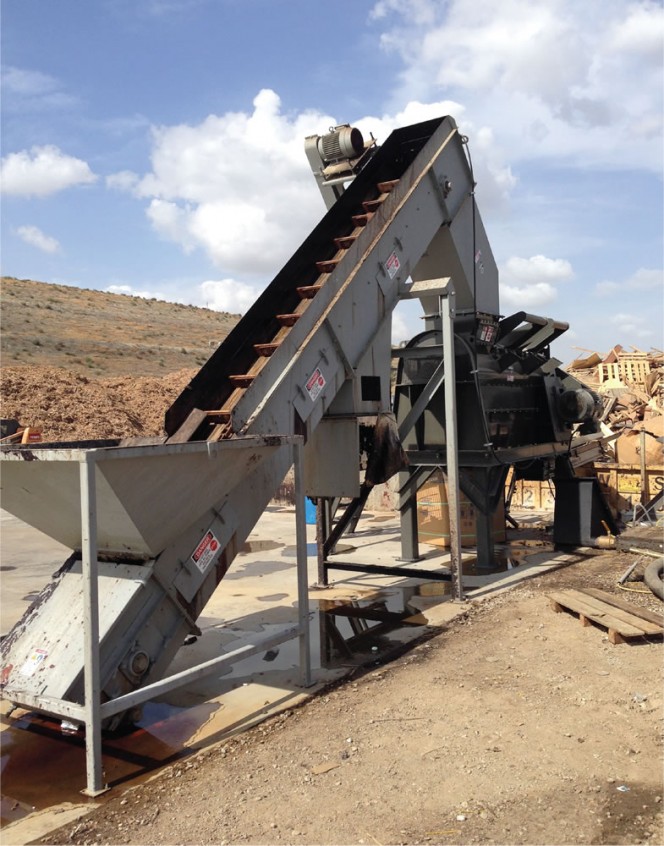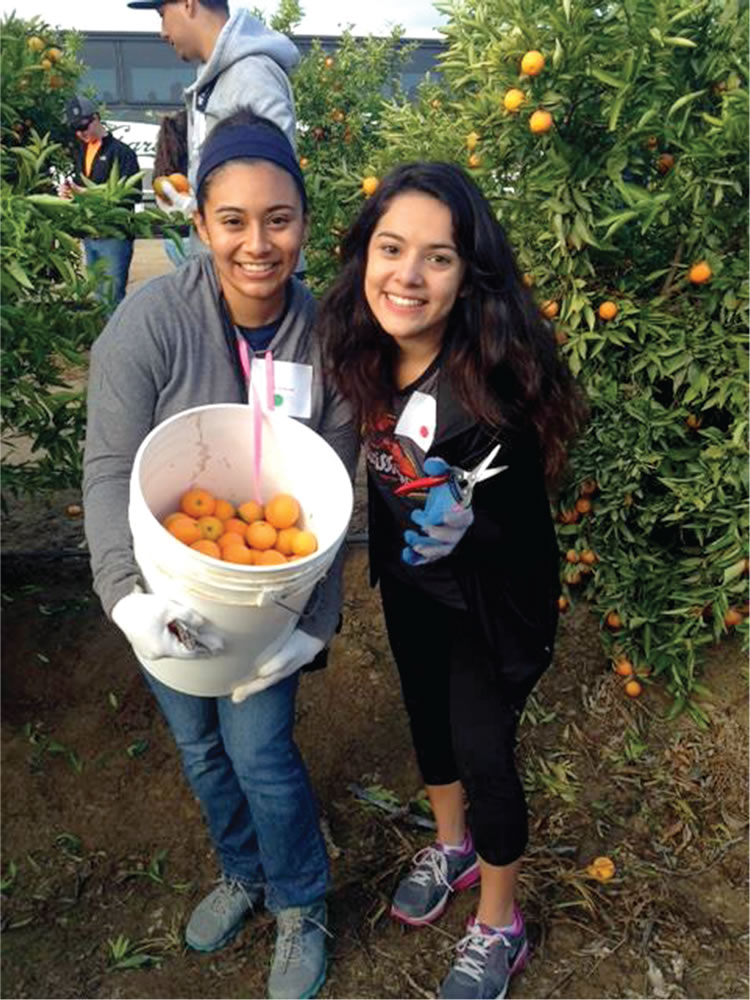Fresno Metro Ministry and Colony Energy Partners received a $2.9 million CalRecycle grant to help expand Metro’s Food To Share Program and build an anaerobic digester for nonedible food.
Claire Siegrist
BioCycle March/April 2016
In November 2014, Colony Energy Partners and Fresno Metro Ministry (Metro) were awarded a $2.9 million grant from the State of California’s CalRecycle Greenhouse Gas Reduction Fund (GGRF) to build an anaerobic digester in Tulare and to expand Metro’s Food to Share program. Through this partnership, food that cannot be recovered and donated to disadvantaged communities will be sent to the anaerobic digester.

Food To Share was established in June 2015 to ramp up a countywide network to rescue and donate food that would otherwise be disposed. Photos courtesy of Fresno Metro Ministry
CalRecyle’s Organics Grant Program is funded through Cap and Trade revenues in the state’s Greenhouse Gas (GHG) Reduction Fund and must be used toward projects that reduce GHG emissions. Landfills account for 20 percent of California’s methane emissions. Methane is one of three GHGs targeted by the California Air Resources Board (ARB) in its recently released strategy to reduce short-lived climate pollutants. The ARB identified keeping food waste out of landfills as an effective way to reduce methane emissions. Furthermore, CalRecycle developed, and recently revised in collaboration with ARB, an emissions reduction factor for rescued food, which CalRecycle utilized in the first Organics Grant Program cycle. The original emissions reduction factor was 1.53 metric tons (MT) of CO2e/short ton of food rescued. ARB has updated the emission reduction factor for the FY 2015-16 quantification methodology and calculator to 2.0 MT CO2e/short ton of food rescued.
Food To Share
Even though Fresno County is the top producing agricultural county in America, nearly one-quarter of the county’s residents live in poverty. Fresno is also the second most food insecure city in the country. Using $226,000 of the $2.9 million awarded by the CalRecycle grant, Keith Bergthold, Executive Director of Metro, is working to expand the Food to Share network. Food to Share is a community food partnership that provides unique opportunities to address both food insecurity and environmental solutions.
As a result of securing the CalRecycle grant, Colony Energy and Metro sought out the expertise, connections and capacities of the Community Food Bank and its leader Andy Souza to discuss the possible scale and distribution of food waste streams and potential recovery opportunities in the region. The trio wanted to design and encourage new infrastructure and collaborative processes that could be co-located in Fresno and Tulare counties “to capture greater shares of recoverable food for disadvantaged communities and more efficiently and effectively handle and divert scalable amounts of food waste to renewable energy production,” according to Bergthold. They will apply for large grants to pursue the stages of planning and development required to implement a Food Waste Prevention Hub in Fresno.
Food to Share was originally established in June 2015 to ramp up a county-wide network to rescue and donate food that would otherwise be disposed and to increase access to healthy food in underserved neighborhoods. “At full-scale, Food to Share will rescue 65 tons of edible food, resulting in a reduction of 46.7 tons of carbon dioxide emissions annually from the region’s landfills,” notes Bergthold.
Food to Share works closely with the Fresno State Food Recovery Network (FSFRN). FSFRN’s mission is “to fight food waste and hunger by recovering surplus perishable food from their campuses and surrounding communities that would otherwise go to waste, and donating it to people in need.” Within two months of starting FSFRN in December 2013, over 16,000 pounds of food were recovered and a hot meal program was created at St. Paul Newman Center to provide dinners every Friday to feed the community and students. “To keep the food rescue project sustainable, the sociology faculty advisers incorporated it into their service-learning courses and offered semester credits for participation in FSFRN,” noted Bergthold in the CalRecycle case study. “The Fresno State Agriculture Department incorporated the project to teach students logistics, planning techniques, event coordination and risk management.”

Student volunteers assist with gleaning fruit trees in Fresno. Photos courtesy of Fresno Metro Ministry
“Food to Share hopes to expand to have a county-wide network of over 50 faith-based and community food organizations like Poverello House, Catholic Charities, and many others who serve disadvantaged communities,” adds Bergthold. “As the network expands, meals provided from rescued food for Fresno’s disadvantaged communities are expected to increase accordingly.” With grants from the The Bennett Family Foundation Fund at the Central Valley Community Foundation, Metro is able to support the work of Co-Project Managers Song Vang and Tom Matott, and Program Director Chanel Ruiz-Mendez. They are establishing relationships with nearby farms, growers and packers, grocery stores, food distributers, restaurants, caterers, and institutions and coordinating transportation logistics. The GGRF funds also are being used to help finance new commercial refrigerators and freezers, ranges and hoods for initial food recipient partner organizations, and a cargo van — giving Food to Share the physical infrastructure needed to begin expanding operations this spring and provide its partners with even more storage space at their locations. Food that spoils before it is delivered will be sent to Colony Energy Partner’s digester.
“By partnering with Colony Energy, we hope to optimize nutritious food access to and consumption by disadvantaged communities suffering from food hardships, insecurity and nutritional deficits — which significantly prevents and reduces food waste,” explains Bergthold. “It also maximizes renewable energy production from waste that can be systematically diverted from landfills.”
Colony’s Endeavor Digester
This spring, Colony Energy Partners (CEP) will begin construction of its Endeavor Facility Anaerobic Digester in Tulare using its proprietary complete-mix system branded Colony Energy Organic Power System (CEOPS), according to Kent Hawkins, CEP’s Managing Director. Currently, CEP has its food waste receiving and preprocessing system at the Cedar Avenue Recycling & Transfer Station (CARTS) in Fresno, which is managed by Caglia Environmental. Colony Energy receives mostly fats, oils and grease (FOG) and food from compactors and charges $30/ton to process the organics. It has a Scott’s Turbo Separator to depackage and blend incoming organic feedstocks. Two haulers transport the FOG and the blended organics to the Fresno-Clovis Regional Wastewater Reclamation Facility (RWRF) to process these waste streams. The City of Fresno is generating electricity from the biogas produced at its plant.

Colony Energy is using a Scott’s Turbo Separator to depackage and blend incoming food waste feedstocks. Photo courtesy of Colony Energy Partners
Two 2.5 million gallon high-solids digestion tanks that can process up to 125,000 tons/year of organics are being constructed at the Tulare site. The facility is permitted to handle up to 500 tons/day of material with a solids content of up to 40 percent. The $15 million to $20 million Endeavor Facility is sited on an industrial 18-acre parcel adjacent to the City of Tulare Industrial Wastewater Treatment Plant (IWWTP). This location is in an area with access to multiple organic feedstocks — mainly locally collected dairy manure and food and agricultural processing residuals. A covered 100-foot by 200-foot reception and storage area is being constructed. In addition to the Scott’s depackaging unit, Colony Energy will procure another system for post processing of higher solids material.
The digesters are expected to produce more than 1.5 million standard cubic feet/day of biogas that will be upgraded to renewable compressed natural gas (CNG) through a biogas conditioning skid to remove contaminants, and cool the temperature to remove moisture from the biogas. The conditioned and compressed biomethane will be injected into the natural gas grid via a Southern California Gas Company (SoCalGas) transmission line adjacent to the property. Colony Energy already has approval from SoCalGas for the interconnection and allowances to wheel the gas through the pipeline to a CNG fueling station. The Endeavor Facility is one of two anaerobic digesters in California with an interconnection approval. The renewable CNG will be supplied as a diesel alternative to San Joaquin Valley’s on-road truck market. The project anticipates reducing transportation GHG emissions by roughly 41,850 metric tons/year. Nitrous oxide will also be reduced by approximately 35.33 tons annually and particulate matter by approximately 0.71 tons/year.
The Endeavor Facility will procure combined heat and power (CHP) cogeneration modules that will utilize a portion of the digester biogas to generate roughly 600 to 800 kW of electricity and thermal energy to run the plant. Excess thermal energy can also be used to heat the City of Tulare IWWTP’s anaerobic digester. Before the Endeavor Facility is fully built, the Tulare IWWTP may make its excess digester capacity available to process CEP’s organic waste streams, according to Hawkins.
Claire Siegrist is a Contributing Editor to BioCycle.










